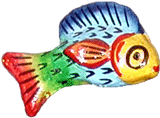Cultura y Comunidad: The Legacy of Latino Leadership in California
Sep 15, 2004 4:00pm - 6:00pm
University Library: Jack & Florence Ferman Presentation Room

Keynote address by Dr. Karin Durán, Chicana/o Studies Librarian, Oviatt Library, September 14, 2004, for the opening reception for the Exhibit.
When I cruised through the exhibit while the finishing touches were put in place, the reaction I first experienced was a comfort level similar to the "hominess" of Sundays at my abuelita's house. There were the tías and tíos (the aunts and uncles) who freely shared their life experiences about work -in a sometimes unfriendly world- in ways that evidenced the wisdom they gained daily through their survival; there were the primos and primas (the cousins) who helped out in the family businesses and who let you ride their "cool" bikes with the streamers and metal-flake paint throughout the neighborhood; there were the vecinos (the neighbors) who shared the fruit from their gardens and humor of their lives; there were the comadres and compadres (godparents and close friends) who watched over their own families -- and everyone else's -- so that we never felt alone in our comunidad…never far from the source of an abrazo (a hug) and "free" advice. These are the gente, the very real people, that created the collections and scholarly works so carefully and lovingly displayed here today.
The title of the exhibit itself :"Cultura y Comunidad: the Legacy of Latino Leadership in California" sets the tone the best. Represented here are documents and artifacts that mark the many and varied places where Latinos have learned and exercised leadership. The spectrum of leadership encompasses the national and the local, from labor to the arts, from grass-roots organizations to the power of the press, from kitchen table meetings to dinners at the White House. Latinos have made their mark historically and currently in the world and in their own back yards.
With these documents we can evaluate and understand all that makes the comunidad, the community, in which we live. There is the story of members of a family that pay school and road taxes or join a mutual aid society, or another that sold food door to door and then established its own restaurant business. There are the Madres of East L.A. who banded together to say "NO" to environmental and social pressures that endanger their neighborhoods. We can witness the first steps of the farmworkers' efforts which eventually resulted in landmark labor contracts. And, who can forget the boyish image of youth and the joy of life reflected in the photo of the young Frank Del Olmo as he progressed through his journalism studies here, at the then San Fernando Valley State College. Our University has often been the flash point for many social activists who have given us a new perspective and understanding of the issues that face the Latino community particularly as we view, create, and document our lives, our history through our own eyes. We now have scholarly works on such areas as Chicano history, Chicana activists, mutual aid societies, health and well-being, barrio urbanism, and the impact of religious orders of nuns. We can enjoy the insightful social commentary of Culture Clash and distinctive art of lowriders. We can acknowledge the slow and steady progress toward meeting the goals of community based organizations such as the educational and social goals of Comisión Femenil San Fernando Valley and of The Supreme Council of the Mexican American Movement. We see the work of organizations dedicated to the support of farmworkers' efforts for justice as evidenced by the Millie A. Moser Smith papers. There are the groups that dedicated themselves to equity in the workplace whose efforts are documented in the Max Mont Collection and the International Longshoreman's and Warehousemen's Union Henry Gaitan Papers. We also have the distinct legacy of the scholarly research and writings of campus faculty stars such as Rudy Acuña, Mary Pardo, Juana Mora, José Hernandez, David Díaz, and Denise Sandoval who have asked provocative questions and whose research has revealed some even more provocative answers that firmly establish the Latino legacy as full partners in the growth, change, and culture that characterizes our daily lives.
So it is with humble pride that I invite you to join with me in enjoying our art, our lives, the fruits of our labors across the full spectrum of what is good and joyful in our comunidad.
So as my abuelito would say, "Pasé, pasé". . . come in -- and make yourself at home!
Assistive Services
Requests for accommodation services (e.g. sign language interpreters or transcribers) must be made at least five (5) business days in advance. Please email library.event@csun.edu in advance of the event.